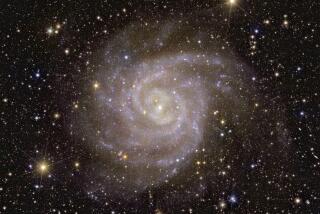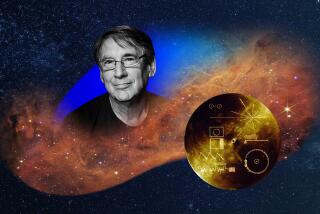Hubble peers deep into the universe, reveals teenage galaxies
- Share via
Astronomers using the Hubble Space Telescope have released one of the most comprehensive images of the universe ever taken, and it is awesome.
The image you see below is not wide, but it is so deep that it stretches back to just a few hundred million years after the big bang.
Harry Teplitz, an astronomer at Caltech in Pasadena, described the view as a pencil beam: narrow if you look at it head-on, but very, very long if you look at it sideways.
“It is a small patch of sky, much smaller than the size of the moon, but because Hubble can see light from very distant galaxies, it goes back 12 billion years,” he said. “The reason you see so many galaxies in the image is because they are at many different distances.”
Hubble has been peering at this small, narrow area of the sky on and off since 2003 in visible light and infrared light, but only recently has it been able to look into this tunnel of space in the ultraviolet wave length.
Adding the ultraviolet light makes for a pretty picture, but it is scientifically significant as well.
“Ultraviolet is where we see the hottest light from the youngest stars,” said Teplitz, who led a new study called “Ultraviolet Coverage of the Hubble Ultra Deep Field.” “It is a direct measure of star formation.”
Previously, astronomers could learn about star formation in the most distant galaxies because the ultraviolet light those hot young stars emitted got red-shifted into the visible range as it traveled through space and time.
They could also learn about star formation in nearby galaxies thanks to missions like NASA’s Galaxy Evolution Explorer, which could look in ultraviolet light at galaxies that were relatively close to our own.
But until now, no one knew how stars were forming 5 to 10 billion years ago. And that is a time when most of the stars in the universe formed, Teplitz said.
“It’s kind of like now, for the first time, we can study galaxies when they are in their teenage years,” he said.







